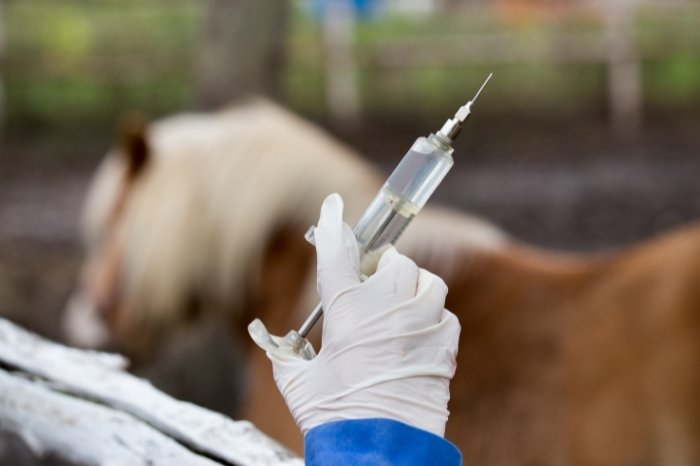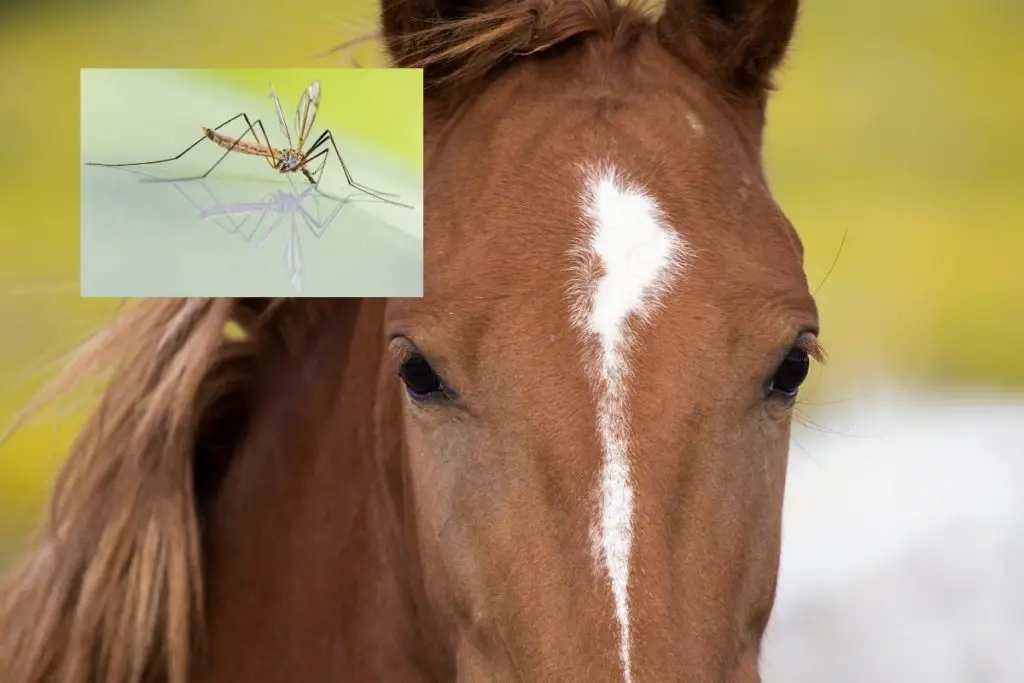Last Updated on March 21, 2022 by Cristina
As a horse owner, it can be very confusing trying to figure out which vaccines your horse should have! The West Nile virus vaccination may be offered as part of your horse’s spring shots by your veterinarian. Let’s find out all about this vaccine and if your horse needs this shot.
What Is West Nile Virus?
West Nile virus (WNV) is a highly infectious disease that is most commonly found in the wild bird population. As the name suggests, this disease was first found in the West Nile region of Uganda, when it was diagnosed in humans. West Nile virus is highly transmissible and can infect humans, birds, and horses.
This problematic virus is spread by a type of mosquito which prefers to bite birds, but they will also have a nibble on other creatures including horses and humans. When a mosquito that has fed on an infected bird then bites a horse, the infection is transmitted.
Although we can take steps to limit the number of mosquitoes our horses are exposed to, it is incredibly difficult to remove the risk altogether. Luckily WNV cannot be spread between horses and humans, and it is only caused by a bite from a mosquito carrying the avian form of the infection.
The problem with WNV is that it has a high fatality rate in horses, with a third of all cases of WNV resulting in death. Around 40% of horses that do not die from WNV will have long-term effects from the disease, including behavioral problems and gait abnormalities.
Click Here to Get More Info about:
Which Horses Should Have The West Nile Virus Vaccination?
West Nile virus is not present all around the world, but in North America, it is now considered to be an endemic disease. This means that it is always present and that vaccination for WNV is one of the core vaccines for horses. It is recommended that all healthy adult horses receive a primary course of the WNV vaccine, followed by annual booster vaccinations.
As well as vaccination, you can reduce the risk of a horse catching WNV by putting effective fly control methods in place. This includes reducing the breeding habitat for mosquitoes, and using fly repellents and fly sheets on your horse.
When Should The West Nile Virus Vaccination Be Given?
The vaccination schedule for West Nile virus in horses depends on whether the horse has been vaccinated before or not. For unvaccinated horses or those of unknown vaccination status, a primary course of vaccinations is required. Horses that have previously been vaccinated against WNV will require booster vaccinations according to their risk and the region’s disease status.
-
Unvaccinated Horses
Any horse that has not been vaccinated against WNV should have a started course of injections in the spring, to give peak immunity during mosquito season. This normally consists of two injections, given three to six weeks apart.
Younger horses less than one year of age should be given three injections. The first two doses are given three to four weeks apart, and then a third dose is administered six to eight weeks later.
In-foal mares can be given a vaccine against WNV during the first trimester, but this should be discussed with your veterinarian first. New-born foals should be vaccinated at around two months old if the dam has not been vaccinated.
-
Horses Previously Vaccinated Against WNV
Once a horse has received the primary course of WNV vaccine, subsequent boosters are required to maintain immunity. These are normally timed to give the highest levels of immunity during spring and summer when mosquitoes are at their most active.

It is highly likely that your local veterinary clinic will have a set WNV vaccination protocol based on the risk factors in your area. Younger horses are more susceptible to WNV and are often given boosters more frequently than geriatric horses.
The most common time to give a WNV booster is in the spring, to maximize immunity during peak mosquito season. High-risk animals can be given another booster later in the summer.
West Nile Virus Vaccination Summary
So, as we have learned, the West Nile virus vaccination is an important method of protecting horses from this debilitating disease. West Nile virus is transmitted by mosquitoes that have fed on infected wild birds, and vaccination is the most effective way to prevent a horse from catching this disease. Around one in three horses that catch West Nile virus will die as a result.
We’d love to hear your thoughts on the West Nile vaccine for horses! Do you make sure that your horse always has this shot? Or perhaps you’ve got a question about when a horse needs a vaccine for West Nile virus? Leave a comment below and we’ll get back to you!
FAQ’s
Do Horses Need West Nile Vaccine?
In areas where West Nile virus is endemic, the only protection available against this disease is vaccination. Veterinarians advise that all healthy horses in North America should be vaccinated against this disease.
What Is The West Nile Virus Vaccine For Horses?
There are four vaccines licenced by the USDA against West Nile virus in horses. All have been proven to greatly reduce the risk of a horse catching West Nile virus when the recommended vaccination schedule is followed.
Are There Any West Nile Virus Vaccine For Horses Side Effects?
Side effects from this vaccine are relatively mild. The horse may experience some tenderness at the vaccination site. He may also be lethargic and have a decreased appetite.
How Much Does The West Nile Virus Vaccine For Horses Cost?
The cost of the West Nile vaccine will vary according to the type of vaccine your veterinarian uses, and whether it is combined with any other shots. A single West Nile virus vaccine can be around $30, whereas a three-way shot could be between $40 and $60.
As a horse owner, you should factor these costs as part of your annual healthcare budget for your horse. The cost of a vaccination is far cheaper than treating a horse for any of these preventable diseases, and you may even save your horse's life!

